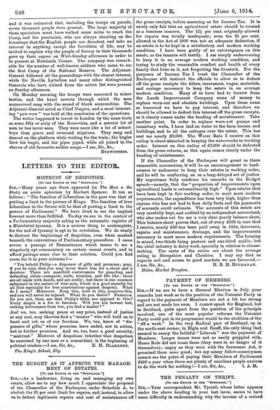THE BUDGET AS IT AFFECTS THE MANAGE- MENT OF ESTATES.
[To ins Emma or ism "Bernal's."]
Stn,—As a landowner, living on and managing my own estate, allow me to say how much I appreciate the proposal of the Chancellor of the Exchequer, under Schedule A, to abolish the 25 per cent. limit for repairs, and, instead, to allow us to deduct legitimate repairs and cost of maintenance off the gross receipts, before assessing us for Income Tax. It is surely only fair that an agricultural estate should be treated as a business concern. The 14 per cent. originally allowed for repairs was totally inadequate ; even the 25 per cent. allowed in the Act of 1909 was not an adequate deduction, if an estate is to be kept in a satisfactory and modern working condition. I have been guilty of no extravagance on this estate, as the tenants will testify. I am simply endeavouring to keep it in an average modern working condition, and trying to study the reasonable comfort and health of every family that lives on it, not forgetting the livestock. For the purposes of Income Tax I trust the Chancellor of the Exchequer will instruct the officials to allow us to deduct off the gross receipts the tithes, insurances, wages, materials, and cartage necessary to keep the estate in an average modern condition. Many of us have had to borrow from the Lands Improvement Company sums of money to replace worn-out and obsolete buildings. Upon these sums so borrowed we have to pay interest, and therefore we should be allowed to deduct this interest off the gross receipts, as it clearly comes under the heading of maintenance. Take another point. In order to replace worn-out pumps and insanitary wells, I have laid on water to the farm houses and buildings, and to all the cottages over the estate. This has cost me nearly £3,000. The Water Rate I receive on this outlay is about absorbed in keeping the waterworks in working order. Interest on this outlay of £3,000 should be deducted from the gross returns, as this again comes clearly under the heading of maintenance.
If the Chancellor of the Exchequer will grant us these reasonable concessions, it will be an encouragement to land- owners to endeavour to keep their estates in working order, and he will be conferring on us a long-delayed act of justice My experience fully confirms his remarks in the Budget speech—namely, that the " proportion of improvements upon agricultural lands is extraordinarily high." Upon estates that have been kept in fair working order, to meet more modern requirements, the expenditure has been very high, higher than anyone who has not bad to face daily facts and the payments of accounts could estimate. The accounts of this estate are very carefully kept, and audited by an independent accountant; who also makes out for me a very clear yearly balance-sheet, This balance-sheet proves that, out of every £100 in rent that I receive, nearly £40 has been paid away in tithe, insurance, repairs and maintenance, drainage, and the improvements necessary to meet more modern requirements. The farming is mixed, two-thirds being pasture and one-third arable; but the chief industry is dairy work, specially in relation to cheese- making. The rents of the estate are about the average ruling in Shropshire and Cheshire. I may say that as regards soil and access to good markets we are favoured.—










































 Previous page
Previous page